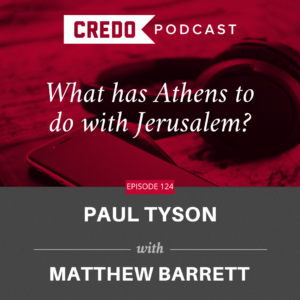Show Notes
 From Plato to Aristotle, Greek philosophy posits a transcendent view of reality often not appreciated by contemporary Christians living after modernism. But transcendence in Greek thought was not lost on the biblical authors. Narratives such as John 1 and Acts 17 reveal that the biblical authors understood and critically appropriated classical Greek philosophy into their teaching and theology.
From Plato to Aristotle, Greek philosophy posits a transcendent view of reality often not appreciated by contemporary Christians living after modernism. But transcendence in Greek thought was not lost on the biblical authors. Narratives such as John 1 and Acts 17 reveal that the biblical authors understood and critically appropriated classical Greek philosophy into their teaching and theology.
With time Christian Platonism became inescapable, even pivotal, for philosophers and theologians in late antiquity. Christian Platonism allowed church fathers and medieval scholastics to cast a vision for not merely a list of beliefs but a comprehensive outlook on reality. Augustine, for example, reshaped his understanding of divine transcendence and fundamentally alter his reading of the Bible based on his reading of the Platonists. And Thomas Aquinas synthesized a Platonist metaphysic with Aristotelian logic, bringing both into an Augustinian understanding of the Christian faith in order to present a coherent and cohesive picture of the world. Unfortunately, with the rise of the Enlightenment modernist thinkers have turned towards a materialistic direction, severing the cord of participation between the truth, goodness, and beauty of this world and the one who is Truth, Goodness, and Beauty himself.
In this episode, Matthew Barrett sits down with Paul Tyson from the University of Queensland to discuss the historical tapestry Christian Platonism across the Great Tradition, shedding light on the importance of the intersection of theology and philosophy for today.
Paul Tyson is an Honorary Senior Fellow at the Institute for Advanced Studies in the Humanities, University of Queensland (Australia), and author of Returning to Reality: Christian Platonism for Our Times (Cascade, 2014), and A Christian Theology of Science (Baker, forthcoming 2022).
Matthew Barrett is the editor-in-chief of Credo Magazine and host of the Credo podcast. He is associate professor of Christian theology at Midwestern Baptist Theological Seminary and Director of the Center for Classical Theology. He is the author of the award-winning Simply Trinity and his new book is called, The Reformation as Renewal. He is currently writing a Systematic Theology (Baker Academic).
